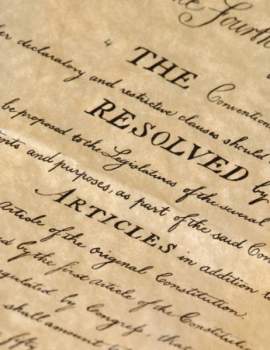
Who Is Thomas Paine

Popular In Constitution
Purpose Of Lifetime Appointment And Pros And Cons Enumerated Powers Bicameral Legislature Background Article 3 Of The Constitution We The People 1st Amendment Who Wrote The Constitution Judicial Review Equal Protection Clause 5th Amendment 10th Amendment Three Fifths Compromise
Through his widely-read pamphlet, Common Sense, the words and teachings of Thomas Paine eventually sparked a following necessary for the American Revolution. Thomas Paine, a founding father of the United States of America, was considered a radical intellectual who doggedly advocated colonial America's sovereignty from Great Britain's Monarch. Mostly for his work in Common Sense, Paine is referred to as the "The Father of the American Revolution."
Common Sense was published on January 10, 1776 and quickly became a best-selling piece of literature. The pamphlet which began circulation following the outbreak of the Revolutionary War was adopted as a way of life for many American settlers. The words were read out loud in taverns and small gatherings, effectively spreading the thoughts of Republicanism and boosting enthusiasm for a separation from British rule.
Common Sense strayed away from the generic anti-British publication; it was a radical, pro-active approach, aimed at unifying and mobilizing militias to physically fight for freedom. Although considered crazed by some, Thomas Paine effectively harnessed the emotion of American settlers and unified them into a widespread uprising against British rule.
Dissimilar to other influential works of 18th Century
literature, Common Sense offered the reader an ultimatum of sorts. The pamphlet's
objective was to connect with the individual. It was meant to offer a glimpse
into the future. Thomas Paine wanted the reader to ask him/herself a pretty
simple, yet seldom discussed question. Common Sense provided a new argument for independence. It compelled
the reader to question what the future would be like under British rule. When
individuals read the pamphlet they pondered the true power of tyranny and how
it could negatively strip society of individuality and freedom. Part of Thomas
Paine's brilliance was found in his concise and easy-to-follow writing. Unlike
other publications, Paine's writing style was simple. The average settler could
follow along and be able to attach his/her emotions to the work.
The political writing was intended to be informal; Paine wanted to mobilize the Continental Army to fight against British rule. Paine's objective was not to reach the statesmen or prominent figures of the colonies, but instead the average men and women of society who were directly oppressed by Britain's unjust taxation and cruel punishments. Although Common Sense effectively united colonists together and spawned an anti-British sentiment, it was referred by many as simply a radical and untrustworthy source.
A group of
powerful and respected colonists viewed Thomas Paine as a fraud and his
writings as a poisonous attempt to start a Revolution. John Adams and other
influential politicians believed that Common Sense was inherently dangerous and would eventually create a radical
democracy unable to properly govern its people.
Following the release of Common Sense, Thomas Paine was quickly thrown into a world of
controversy and scandal. Paine was elected to the Congressional Committee on
Foreign Affairs in 1777, but was quickly relieved of his post following secret
negotiations with France. Thomas Paine was a man obsessed with Revolution and
the fight towards freedom. Following his termination from the Congressional Committee
on Foreign Affairs, Paine stepped out of the spotlight only to later return
with influential works revolving around the French Revolution.
Thomas Paine's works and influence may be questioned, but his intentions and his desire to spark Revolution are undoubted. His words were awe-inspiring and often used to boost morale of troops during times of war. Without the words of Common Sense and Paine's influence, the rallying cry of American colonists during the Revolution would have been undeniably softer.
NEXT: Who were the Founding Fathers of America?





















